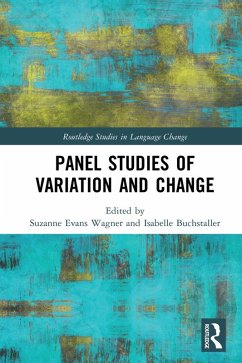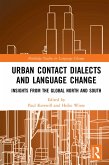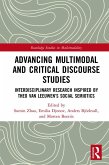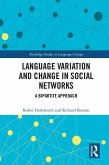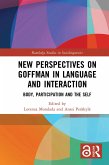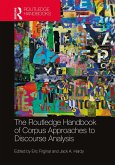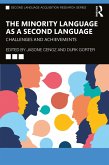Panel Studies of Variation and Change (eBook, PDF)
Redaktion: Wagner, Suzanne Evans; Buchstaller, Isabelle
46,95 €
46,95 €
inkl. MwSt.
Sofort per Download lieferbar

23 °P sammeln
46,95 €
Als Download kaufen

46,95 €
inkl. MwSt.
Sofort per Download lieferbar

23 °P sammeln
Jetzt verschenken
Alle Infos zum eBook verschenken
46,95 €
inkl. MwSt.
Sofort per Download lieferbar
Alle Infos zum eBook verschenken

23 °P sammeln
Panel Studies of Variation and Change (eBook, PDF)
Redaktion: Wagner, Suzanne Evans; Buchstaller, Isabelle
- Format: PDF
- Merkliste
- Auf die Merkliste
- Bewerten Bewerten
- Teilen
- Produkt teilen
- Produkterinnerung
- Produkterinnerung

Bitte loggen Sie sich zunächst in Ihr Kundenkonto ein oder registrieren Sie sich bei
bücher.de, um das eBook-Abo tolino select nutzen zu können.
Hier können Sie sich einloggen
Hier können Sie sich einloggen
Sie sind bereits eingeloggt. Klicken Sie auf 2. tolino select Abo, um fortzufahren.

Bitte loggen Sie sich zunächst in Ihr Kundenkonto ein oder registrieren Sie sich bei bücher.de, um das eBook-Abo tolino select nutzen zu können.
This edited volume brings together the major researchers in the field of panel research, highlighting connections and convergences across and between chapters, methods and findings with the aim of initiating a dialogue about best practices and ways forward in sociolinguistic panel studies.
- Geräte: PC
- mit Kopierschutz
- eBook Hilfe
- Größe: 2.93MB
Andere Kunden interessierten sich auch für
![Urban Contact Dialects and Language Change (eBook, PDF) Urban Contact Dialects and Language Change (eBook, PDF)]() Urban Contact Dialects and Language Change (eBook, PDF)42,95 €
Urban Contact Dialects and Language Change (eBook, PDF)42,95 €![Advancing Multimodal and Critical Discourse Studies (eBook, PDF) Advancing Multimodal and Critical Discourse Studies (eBook, PDF)]() Advancing Multimodal and Critical Discourse Studies (eBook, PDF)46,95 €
Advancing Multimodal and Critical Discourse Studies (eBook, PDF)46,95 €![Language variation and change in social networks (eBook, PDF) Language variation and change in social networks (eBook, PDF)]() Robin DodsworthLanguage variation and change in social networks (eBook, PDF)43,95 €
Robin DodsworthLanguage variation and change in social networks (eBook, PDF)43,95 €![Talking Donald Trump (eBook, PDF) Talking Donald Trump (eBook, PDF)]() Jennifer SclafaniTalking Donald Trump (eBook, PDF)23,95 €
Jennifer SclafaniTalking Donald Trump (eBook, PDF)23,95 €![New Perspectives on Goffman in Language and Interaction (eBook, PDF) New Perspectives on Goffman in Language and Interaction (eBook, PDF)]() New Perspectives on Goffman in Language and Interaction (eBook, PDF)42,95 €
New Perspectives on Goffman in Language and Interaction (eBook, PDF)42,95 €![The Routledge Handbook of Corpus Approaches to Discourse Analysis (eBook, PDF) The Routledge Handbook of Corpus Approaches to Discourse Analysis (eBook, PDF)]() The Routledge Handbook of Corpus Approaches to Discourse Analysis (eBook, PDF)49,95 €
The Routledge Handbook of Corpus Approaches to Discourse Analysis (eBook, PDF)49,95 €![The Minority Language as a Second Language (eBook, PDF) The Minority Language as a Second Language (eBook, PDF)]() The Minority Language as a Second Language (eBook, PDF)42,95 €
The Minority Language as a Second Language (eBook, PDF)42,95 €-
-
-
This edited volume brings together the major researchers in the field of panel research, highlighting connections and convergences across and between chapters, methods and findings with the aim of initiating a dialogue about best practices and ways forward in sociolinguistic panel studies.
Dieser Download kann aus rechtlichen Gründen nur mit Rechnungsadresse in A, B, BG, CY, CZ, D, DK, EW, E, FIN, F, GR, HR, H, IRL, I, LT, L, LR, M, NL, PL, P, R, S, SLO, SK ausgeliefert werden.
Produktdetails
- Produktdetails
- Verlag: Taylor & Francis eBooks
- Seitenzahl: 310
- Erscheinungstermin: 8. September 2017
- Englisch
- ISBN-13: 9781317446408
- Artikelnr.: 49261628
- Verlag: Taylor & Francis eBooks
- Seitenzahl: 310
- Erscheinungstermin: 8. September 2017
- Englisch
- ISBN-13: 9781317446408
- Artikelnr.: 49261628
- Herstellerkennzeichnung Die Herstellerinformationen sind derzeit nicht verfügbar.
Suzanne Evans Wagner is an Associate Professor of Linguistics at Michigan State University. She focuses on post-adolescent sociolinguistic modification, particularly with respect to community language change. She has published in Language Variation and Change and Language in Society. She is a co-editor of the Routledge Studies in Language Change series. Isabelle Buchstaller is professor for varieties of English at Leipzig University. Her research investigates language variation and change, including the mechanisms of intra-speaker instability. Her monograph "Quotatives: New trends and sociolinguistic implications" appeared in 2014. She is a co-editor of the Routledge Studies in Language Change series.
1. Introduction
Isabelle Buchstaller and Suzanne Evans Wagner
I. Methodological conundrums in building, sharing and analyzing panel
corpora
2. Before there were corpora: The evolution of the Montreal French
project as a longitudinal study
Gillian Sankoff
3. Alternative sources of panel study data: Opportunities, caveats and
suggestions
Christopher Cieri and Malcah Yaeger-Dror
4. On the utility of composite indices in longitudinal language study:
The case of African American Language
Janneke Van Hofwegen and Walt Wolfram
II. Key life-stage events across the life-span
5. Longitudinal sociophonetic analysis: What to expect when working with
child and adolescent data
Mary Kohn and Charlie Farrington
6. The influence of age on estimating sound change acoustically from
longitudinal data
Ulrich Reubold and Jonathan Harrington
III. Stylistic determinants of linguistic malleability
7. Comparing speech samples: On the challenge of comparability in panel
studies of language change in real time
Frans Gregersen, Torben Juel Jensen and Nicolai Pharao
8. The effect of small Ns and gaps in contact on panel survey data
Patricia Cukor-Avila and Guy Bailey
9. What makes a panel study work? Researcher and participant in real
time
Suzanne Evans Wagner and Sali A. Tagliamonte
IV. Interdisciplinary approaches
10. Ethnographic perspectives on panel studies and longitudinal research
Chantal Tetreault
11. Longitudinal studies in sociolinguistics and SLA: Bridging two
parallel routes
Hélène Blondeau
Isabelle Buchstaller and Suzanne Evans Wagner
I. Methodological conundrums in building, sharing and analyzing panel
corpora
2. Before there were corpora: The evolution of the Montreal French
project as a longitudinal study
Gillian Sankoff
3. Alternative sources of panel study data: Opportunities, caveats and
suggestions
Christopher Cieri and Malcah Yaeger-Dror
4. On the utility of composite indices in longitudinal language study:
The case of African American Language
Janneke Van Hofwegen and Walt Wolfram
II. Key life-stage events across the life-span
5. Longitudinal sociophonetic analysis: What to expect when working with
child and adolescent data
Mary Kohn and Charlie Farrington
6. The influence of age on estimating sound change acoustically from
longitudinal data
Ulrich Reubold and Jonathan Harrington
III. Stylistic determinants of linguistic malleability
7. Comparing speech samples: On the challenge of comparability in panel
studies of language change in real time
Frans Gregersen, Torben Juel Jensen and Nicolai Pharao
8. The effect of small Ns and gaps in contact on panel survey data
Patricia Cukor-Avila and Guy Bailey
9. What makes a panel study work? Researcher and participant in real
time
Suzanne Evans Wagner and Sali A. Tagliamonte
IV. Interdisciplinary approaches
10. Ethnographic perspectives on panel studies and longitudinal research
Chantal Tetreault
11. Longitudinal studies in sociolinguistics and SLA: Bridging two
parallel routes
Hélène Blondeau
1. Introduction
Isabelle Buchstaller and Suzanne Evans Wagner
I. Methodological conundrums in building, sharing and analyzing panel
corpora
2. Before there were corpora: The evolution of the Montreal French
project as a longitudinal study
Gillian Sankoff
3. Alternative sources of panel study data: Opportunities, caveats and
suggestions
Christopher Cieri and Malcah Yaeger-Dror
4. On the utility of composite indices in longitudinal language study:
The case of African American Language
Janneke Van Hofwegen and Walt Wolfram
II. Key life-stage events across the life-span
5. Longitudinal sociophonetic analysis: What to expect when working with
child and adolescent data
Mary Kohn and Charlie Farrington
6. The influence of age on estimating sound change acoustically from
longitudinal data
Ulrich Reubold and Jonathan Harrington
III. Stylistic determinants of linguistic malleability
7. Comparing speech samples: On the challenge of comparability in panel
studies of language change in real time
Frans Gregersen, Torben Juel Jensen and Nicolai Pharao
8. The effect of small Ns and gaps in contact on panel survey data
Patricia Cukor-Avila and Guy Bailey
9. What makes a panel study work? Researcher and participant in real
time
Suzanne Evans Wagner and Sali A. Tagliamonte
IV. Interdisciplinary approaches
10. Ethnographic perspectives on panel studies and longitudinal research
Chantal Tetreault
11. Longitudinal studies in sociolinguistics and SLA: Bridging two
parallel routes
Hélène Blondeau
Isabelle Buchstaller and Suzanne Evans Wagner
I. Methodological conundrums in building, sharing and analyzing panel
corpora
2. Before there were corpora: The evolution of the Montreal French
project as a longitudinal study
Gillian Sankoff
3. Alternative sources of panel study data: Opportunities, caveats and
suggestions
Christopher Cieri and Malcah Yaeger-Dror
4. On the utility of composite indices in longitudinal language study:
The case of African American Language
Janneke Van Hofwegen and Walt Wolfram
II. Key life-stage events across the life-span
5. Longitudinal sociophonetic analysis: What to expect when working with
child and adolescent data
Mary Kohn and Charlie Farrington
6. The influence of age on estimating sound change acoustically from
longitudinal data
Ulrich Reubold and Jonathan Harrington
III. Stylistic determinants of linguistic malleability
7. Comparing speech samples: On the challenge of comparability in panel
studies of language change in real time
Frans Gregersen, Torben Juel Jensen and Nicolai Pharao
8. The effect of small Ns and gaps in contact on panel survey data
Patricia Cukor-Avila and Guy Bailey
9. What makes a panel study work? Researcher and participant in real
time
Suzanne Evans Wagner and Sali A. Tagliamonte
IV. Interdisciplinary approaches
10. Ethnographic perspectives on panel studies and longitudinal research
Chantal Tetreault
11. Longitudinal studies in sociolinguistics and SLA: Bridging two
parallel routes
Hélène Blondeau
